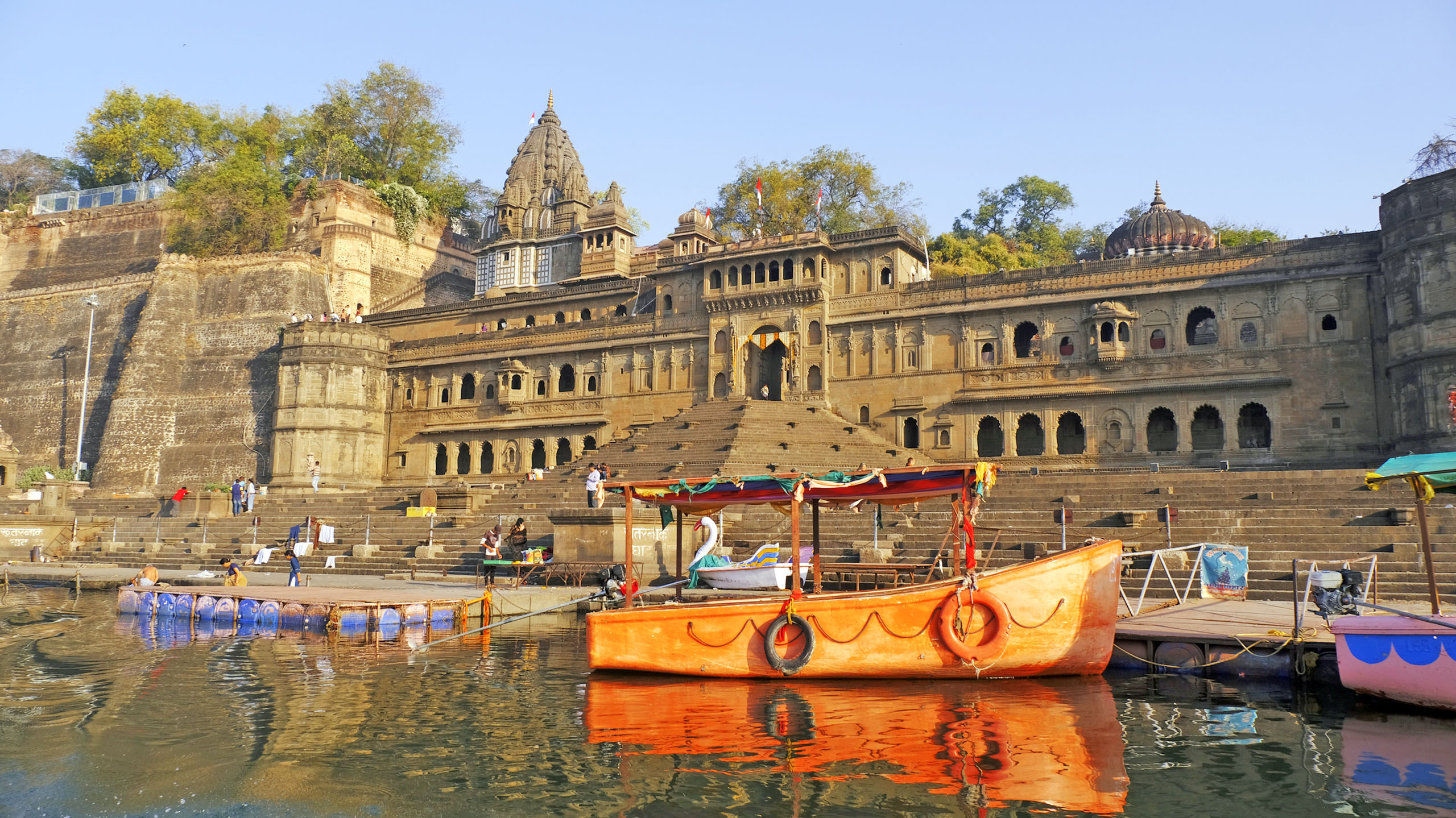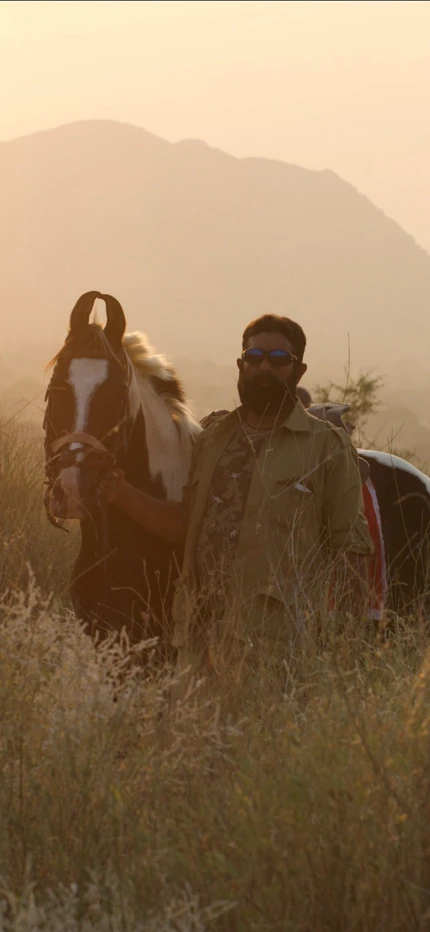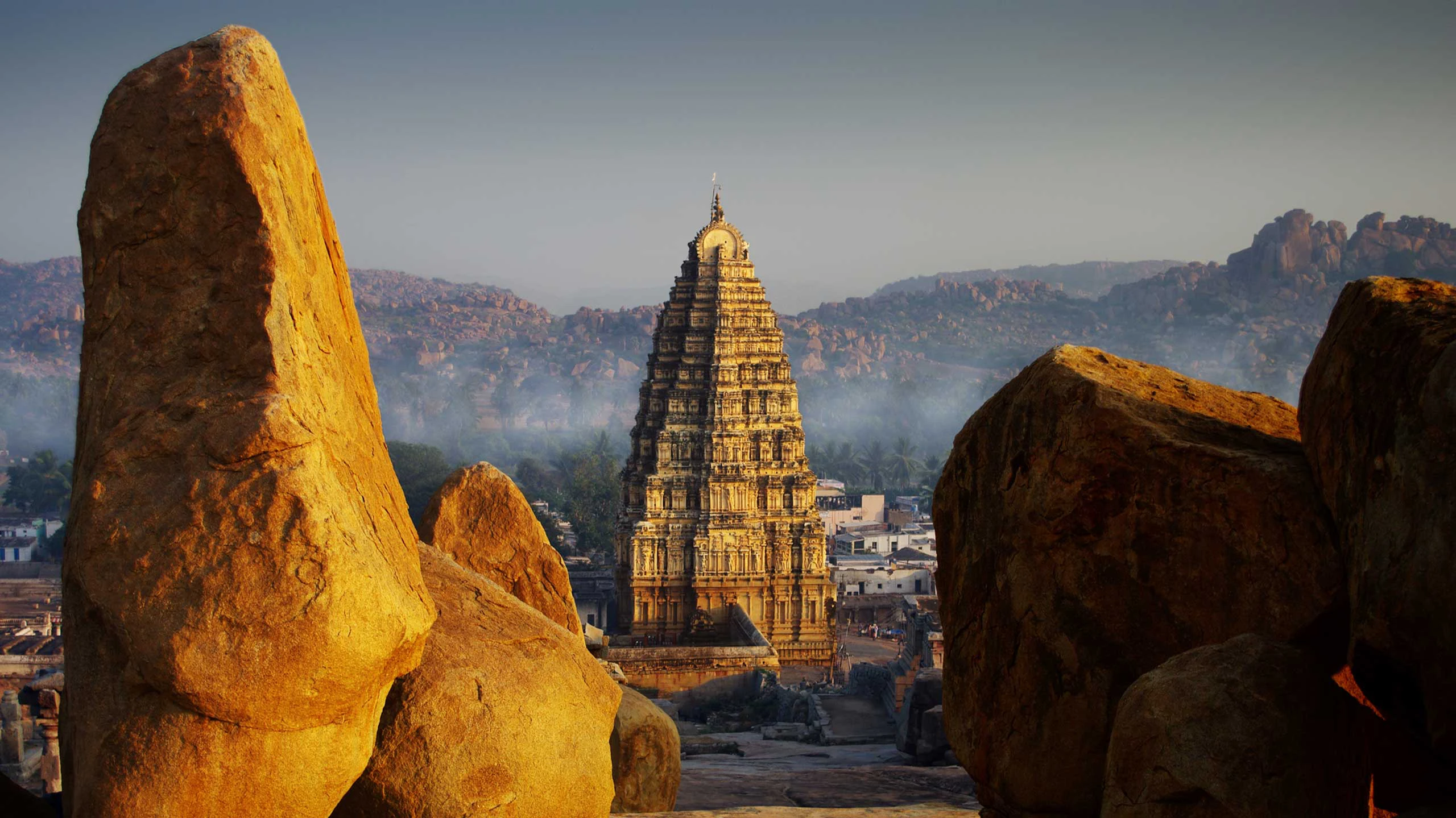The Magnetism of Maheshwar – an Interview with Prince Yeshwant
by Emma D’Arcy
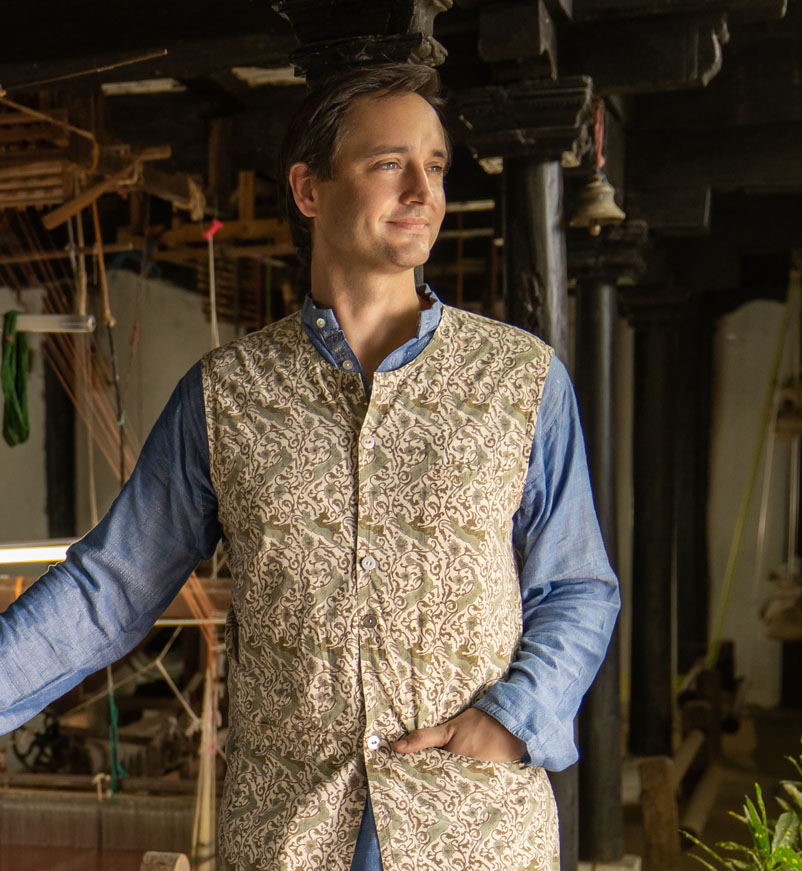
Deciding where to visit in this enchanting country is therefore a true challenge and one that requires great expertise. That’s why we were delighted to speak to Prince Yeshwant Rao Holkar, a member of one of the country’s prominent royal families, about one of India’s most captivating destinations: the fabled town of Maheshwar.
Famed for its architectural splendour, sacred ghats and Maheshwari sarees, we wanted to uncover what makes this destination uniquely special. We also discussed the Holkar family’s Ahilya Fort Hotel, a former palace renowned for offering travellers an experience unlike any other, and the family’s transformative local community work at the REHWA Society.
Located in the Khargone district of Madhya Pradesh state in central India, the town is situated on the peaceful banks of the river Narmada. Steeped in historical significance with a fascinating family legacy, vibrant festivals and spiritual encounters, this is one lesser-known location that offers a truly life-enriching experience.
Beyond the town’s cultural significance and beautiful riverside setting, the Prince explained that part of the reason it’s so special is how it feels to visit. “Maheshwar has a very intimate feeling. You connect to the place quickly because it is digestible. In India, there are so many places that are huge in scale. Maheshwar is much smaller and it’s more personal at the same time. You really feel the weight of thousands of years of history. That manifests in the spirituality found here as one of the most important Shivite centres in India. It is magnificent in its depth but also approachable in its format – you can walk around Maheshwar in a day.”
Maheshwar: A hidden treasure
Given that Indore has been home to the Holkar family for over 300 years, Prince Yeshwant deeply understands what makes Maheshwar unique and why the town resonates with travellers looking for an extraordinary experience. “There’s a sense of stillness, coming back to that question of intimacy. It’s a hidden gem. The people, the energies of Maheshwar. People form connections with each other and meet serendipitously in Maheshwar. There’s a magnetism to it which is very powerful at many levels!”
His father is Prince Richard Holkar, son of the last Maharaja of Indore and descendant of the much revered Queen Maharani Ahilyabai. The family legacy is legendary and woven into the very fabric of Maheshwar’s cultural identity today.
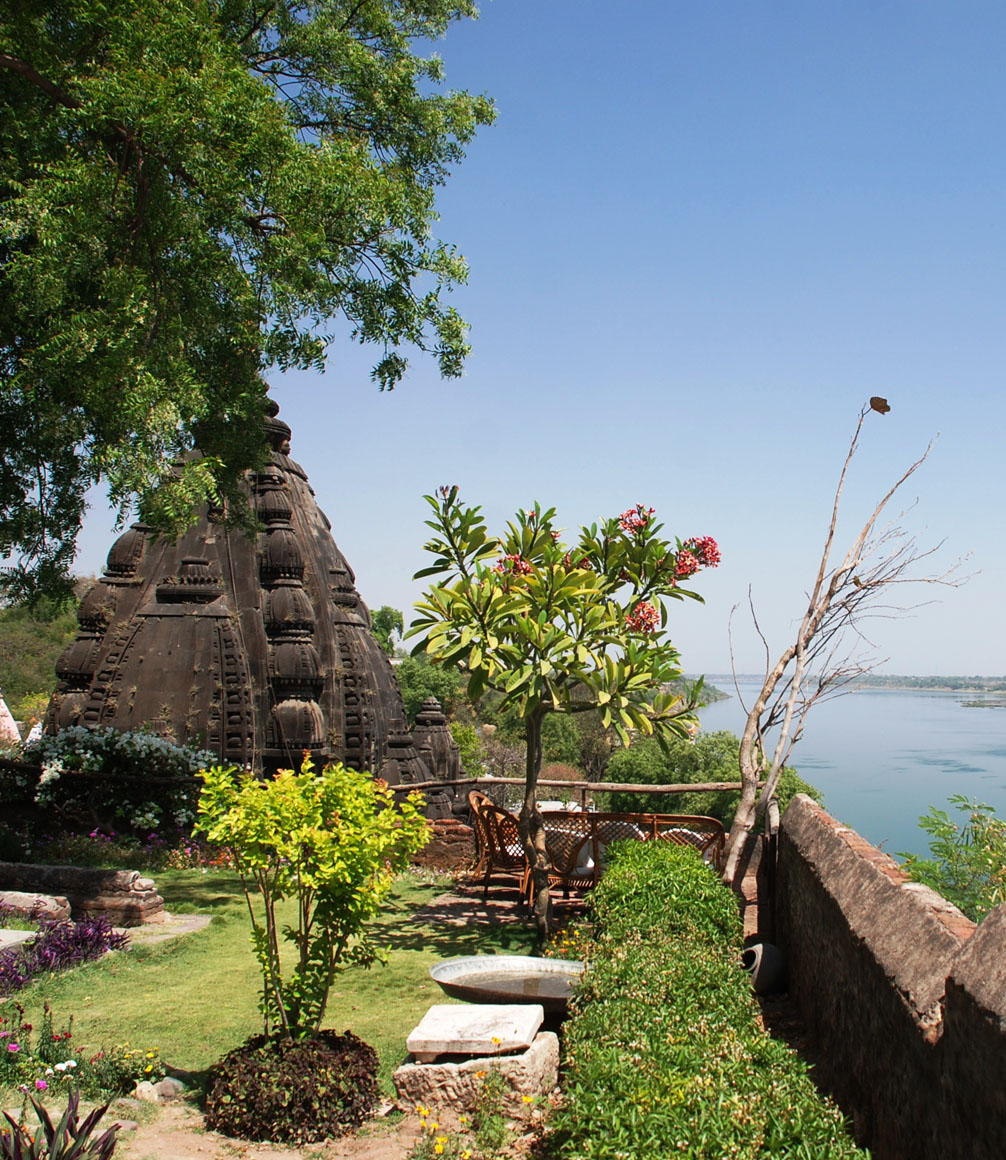
The Narmarda River and peaceful Fort gardens viewed from the Regal Arjuns tent.
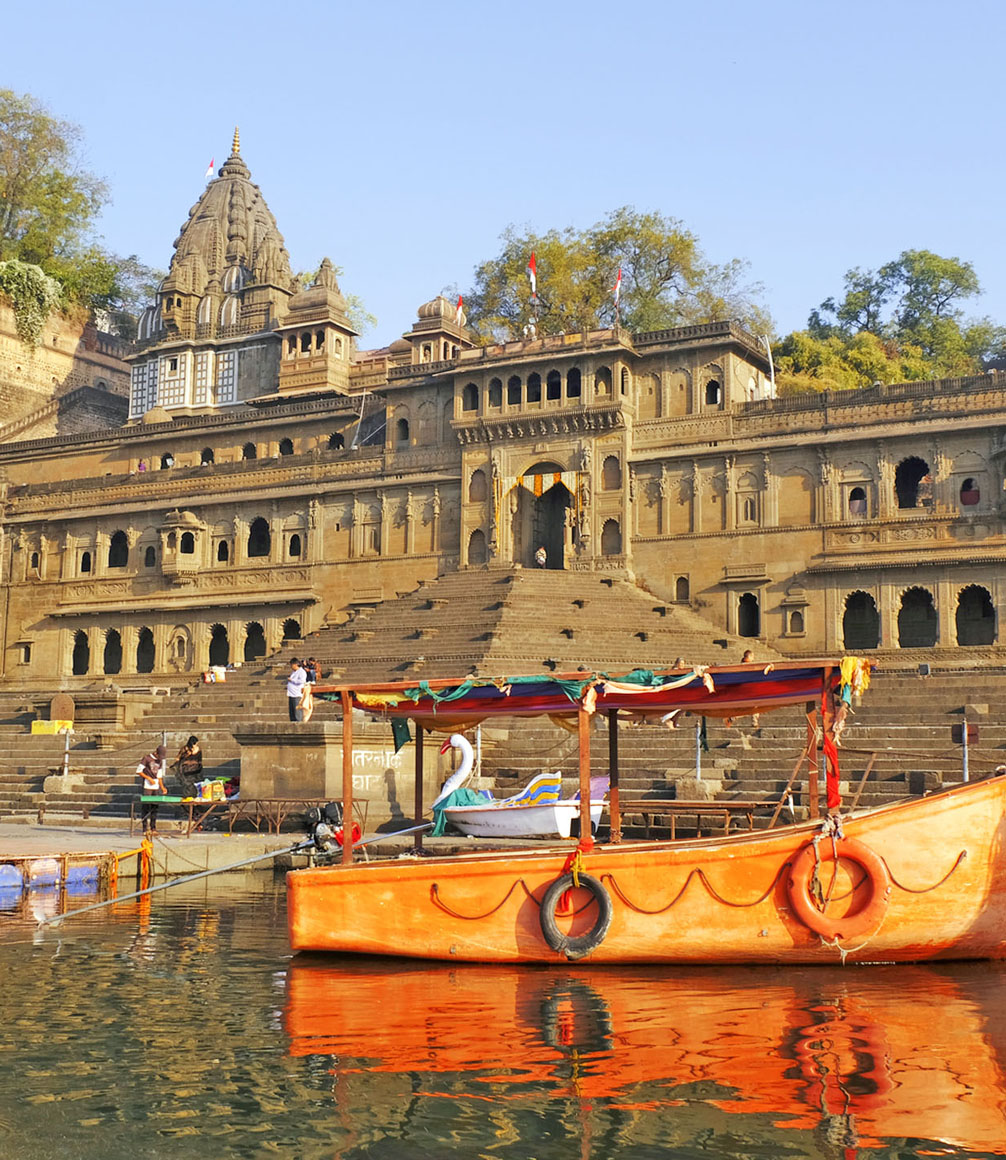
The Ahilya Fort viewed from the river.
'The Ahilya Fort Hotel is a means of promoting and bringing awareness around the textile tradition of Maheshwar, and the REHWA Society is a platform of service to the community and heritage of Maheshwar.'
“The Queen – and everything she stood for – is one of the real visionary leaders of our time. She brought so much to Maheshwar in crafts, as a spiritual centre, in terms of building beautiful temples – all of these things combined.” Maharani Ahilyabai ruled in the eighteenth century and built Ahilya Wada as her personal residence. In 2000, Prince Richard Holkar converted the property into an award-winning guest residence, the Ahilya Fort Hotel. He oversees the guest experience and as a culinary maestro, is actively involved in running the hotel’s organic farm where the gardens are blooming. Prince Yeshwant puts this partly down to the success of a bee-keeping project he’s implemented with the gardening staff focused on sustainability. “The gardens are exploding with avocados and Indore seedless lemons. We started quantifying it. We’ve seen a 50% increase in yield pretty much across the board!”
Today the former eighteenth-century basalt fortress offers visitors a serene oasis from which to explore the town located on the sacred Narmada River. The hotel provides a collection of special experiences from sunset cruises to temple visits, ceremonies and guided walks to enrich your time here. After days spent exploring, unwind in the peaceful surroundings and enjoy the variety of locations available to dine on Prince Richard’s fixed menus – from breakfast in the garden cottage to dinner on the mandap sitout overlooking the river by candlelight.
Ahilya Fort Hotel: an experience unlike any other
This is no typical heritage hotel, however, “this concept of the heritage hotel where people are immersed in a particular history and lineage, while Maheshwar is very much that, the Fort Hotel is not a heritage hotel in the same way. What you see in the gardens, architecture and the spaces you move around in is really what my father’s vision is, where his focus is on preserving what is. But what ties it and how the spirit of daily life lives on is in the sense of Queen Ahilya. She brought such a sense of service to her people and progressive thinking in her policies. The Ahilya Fort Hotel is a means of promoting and bringing awareness around the textile tradition of Maheshwar, and the REHWA Society is a platform of service to the community and heritage of Maheshwar.”
The focus is on using Ahilya Fort to support various aspects of the local community. This includes the work that happens at the weaving centre and at REHWA Society’s school which provides heavily subsidised education for the weaver’s children. “That’s where it is about the philosophy, the values and the principles that she stood for that we try to carry forward, that my father carries forward in the heritage of the Ahilya Fort Hotel.”
Life-enriching experiences
When it comes to unmissable local cultural experiences and sites of interest: “Some of the most special moments of a Maheshwar experience to me are definitely the sunset boat ride on the Narmada. She’s such a beautiful and powerful river.”
As a temple town and spiritual destination, festivals offer an especially interesting time to visit. The annual Mahashivratri Festival is a real highlight: “It’s a very raw, authentic and different sort of grassroots experience. The flow of life around these festivals is quite different and wonderful. There’s a lovely experience at Jayanti Festival which celebrates the birth of the River Narmada. The tradition is to offer the river a sari as Maheshwar is a textile centre. They offer a sari over a kilometre and a half long and stretch it across the river. It’s wonderful to see the whole town get involved and connect with this river that their lives revolve around.”

Meet the artisan weavers of the REHWA society, a community project run by Ahilya Fort.

Take part in the Sacred River Festival.

Drift along the Narmarda River at twilight.

Enjoy the splendours of the Ahilya Fort Hotel.

Immerse yourself in the culture and history of this mesmerising place.
The Sacred River Festival is another moving experience: “Our sacred River Festival is something that my father started, it’s very special. What’s different about it is the intimacy and scale. It takes place in the setting of Maheshwar’s temples, ghats, and chhatris for a very small audience. That connection between artist and audience is something that even great artists who performed in all the wonderful international venues say, ’We haven’t felt this in years!’
Beyond this, Prince Yeshwant recommends a visit to the REHWA Society, for a glimpse into Maheshwar’s fascinating traditional weaving heritage. ‘Visitors have to understand the history and the cultural context by seeing the weaving. A visit to REHWA Society is a must to see how those textiles have been hand-woven for the last 250 years. To understand how much work, effort and skill goes into every one of those textiles.’
Transforming lives: the Ahilya legacy
The Holkar family has revived Maheshwar’s ancient weaving tradition through the REHWA Society, which has proven transformative for the local community and women weavers. The advent of the power loom threatened this traditional art form, so Prince Yeshwant’s parents came up with the concept of REHWA Society in 1979. Offering design input and a market for authentic textiles the Prince explains, ‘It really was the genesis of a lot of revival of hand weaving in Maheshwar. And through REHWA Society then we also understood that the women would come to weave and we found that they were much more dedicated to their craft.’
The creation of exquisite saris and fabrics was successful, and as many of the women were raising young children this led to the building of the Ahilya School. Today projects continue to expand to support the female weavers, from a housing colony to a thriving community health centre that tackles women’s health issues including anaemia – a big problem in impoverished rural India. Health camps, basic self-defence and more are offered, ‘because we find that they are the ones in so many parts of the world who have given everything they get and have nothing coming to them.’ Remarkably, ‘three generations now of people (from one family) have been part of this journey of REHWA Society, and it’s rewarding to see that.’
Prince Yeshwant’s passion for his hometown and giving back to the community is infectious. It’s uplifting moments – meeting with the women weavers, discovering the spiritual heartbeat of Maheshwar at its festivals and serendipitous encounters with other travellers – that create such a uniquely enriching experience.
Perspectives: welcome to our world
Our new interview series illuminates the perspectives of pioneers, visionaries and change-makers that we have the great pleasure and privilege of working with. See the world through the eyes of local experts.
Gain insights and inspiration about the destinations, awe-inspiring experiences, innovative projects and people who can enrich your travel adventures. Through these perspectives, you will discover life-affirming travel experiences you never dreamed possible.
Ready to take the road less travelled?
